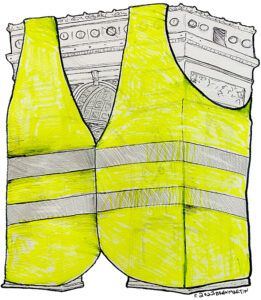“The People Who Are Nothing” Strike Back: The 2023 Retirement Age Protests in France
Shortly after he was elected, Emmanuel Macron mused about “successful people” and “people who are nothing.” To his critics, these remarks—made before an audience of entrepreneurs at the inauguration of a “start-up” campus—distilled everything they disliked about France’s new president, a former investment banker who assumed the nation’s highest office at the age of thirty-nine. In Macron’s eyes, ordinary working people seemed to be little more than extras in a movie in which the heroes are corporate movers and shakers. It is the great irony of Macron’s presidency that, perhaps more than any of his predecessors, this champion of French innovation has provoked periodic revolts of “people who are nothing” and stirred the resentment of those who never made it to the ranks of the “successful.” In his first term, Macron’s policies triggered the so-called “yellow vest” movement, an uprising of employees and small business owners living on the peripheries of major cities, who bristled at being the sacrificial lambs of the president’s environmental agenda. In early 2023, a freshly reelected Macron rammed through a reform of the French retirement system, which required most workers to wait until 64 before being eligible for full benefits (compared to 62 previously).

It is easy to dismiss the mass demonstrations against Macron’s reform as a tantrum by pampered labor force against a perfectly reasonable attempt to strengthen the long-term viability of the nation’s social welfare system. Macron prevailed by mostly ignoring the din of criticism and holding tight until the measure was approved. But rather than inspire an ethos of entrepreneurship, as he once hoped, Macron’s presidency has catalyzed an emerging cleavage around work itself: on the one hand, the “successful”—a performance-oriented managerial classes—and on the other, an increasingly disenchanted and disempowered workforce—“people who are nothing.”
* * *
In recent decades, the term réforme (i.e, reform) has acquired a certain mystique—while also arousing considerable suspicion. The term’s meaning is more precise than the word alone would suggest. It refers to the desire to modernize and liberalize the French welfare state and specifically the benefits that are financed by employer contributions and payroll taxes, of which health care and retirement are the most important. Since the onset of globalization in the late twentieth century, which led governments to prioritize tighter budgets and international competitiveness, réforme has always been high on the political agenda. Over the past thirty years, such reforms have been proposed with metronymic regularity. In 1995, Alain Juppé, Jacques Chirac’s first prime minister, proposed a major overhaul of welfare benefits. Ten year later, a new Chirac prime minister, Dominique de Villepin, introduced a measure to liberalize labor laws to address the issue of youth unemployment. In 2007, Chirac’s successor, Nicolas Sarkozy, won the presidency on overtly reformist principles, telling voters that they should be able to “work more to earn more”—a jab at the disincentives that Sarkozy believed existed in France for remunerative labor. In 2011, Sarkozy’s prime minister took a first stab at lowering the retirement age.
While these measures were all proposed by conservatives, the left, too, has displayed its fair share of reformist zeal. In 1983, socialist president François Mitterrand put his nationalizing binge on hold, introducing austerity measures to prevent capital flight and protect the national currency. More recently, François Hollande, another socialist, tried to introduce labor market reforms, arguing—with little success—that such measures were consistent with the left’s values. These recurring cycles of reform are tied to another persistent dynamic of French political culture: recourse to la rue—i.e., mass street demonstrations, aimed at rejecting reforms through a citizens’ veto. The response to the 1995 plan set the standard for anti-reform movements: a determined strike movement paralyzed much of the country’s transportation system for two months, forcing the government to retract its proposal.
The dialectic of reform and protest feeds into pervasive stereotypes about the French—that they are contentious, committed socialists, and hell-bent on protecting “four-day work weeks” (as South Carolina Senator Tim Scott said in a recent Republican debate). While there might be elements of truth to these assumptions, the deeper reasons for the reform-protest twostep lie in the way France has grappled with globalization. Beginning in the early 1990s, France became a full-fledged partner in the project of accelerated European integration, committing it to open its borders to the members of an expanding European Union and to capping budget deficits and public debt. At the same time, measures were needed to make the country competitive on international markets, which resulted in significant deindustrialization, high levels of unemployment, and social unease.
France has a social welfare state that is more “Bismarckian” than “Beveredgian”: in other words, it is financed by income generated by work (employer contributions and payroll deductions) rather than taxes paid to the state. In practice, this meant that those who were employed had a relatively high standard of living (and access to the full array of social benefits), while those who were unemployed—a persistent problem from the 1970s until the 2010s—lacked both income and the benefits that accrued from work. French governments struggled on two fronts, seeking to liberalize the economy to ensure its resilience on European and international markets, while also introducing new benefits—“social transfers”—to offset the social consequences of chronic unemployment. Meanwhile, the commitment to European integration of both the center right and the center left meant that most parties of government were invested in reform to some degree. The sense that parties on both ends of the spectrum are governed by a single, reform-minded ideology (sometimes called la pensée unique, or “the only way of thinking”) means that the French often express their frustration by voting out incumbents and favoring out-of-the-mainstream parties like the far-right National Rally (the former National Front).
Each new round of protest inspires French people of a conservative or right-leading disposition to lament: “Il est impossible réformer de la France”—“It is possible to reform France.” To an extent, this is true. Public opinion polls indicate that French people hold a quite dim view of capitalism and “liberalism” (in the sense of free-market policies). Many French social benefits are defined by industry-specific collective bargaining agreements, which gives classes of employees and their labor organizations vested interests in defending the status quo. The French often refer to these as acquis sociaux—that is, benefits they have earned or “acquired” over time through struggle and negotiation. Consequently, France’s leaders have generally sought to placate their citizens. As the political scientist Kevin Brookes notes, “France saw a greater overall rise in the generosity of its social system than other [European] countries and by 2008 was the third most generous welfare state in Western Europe,” particularly due to growth in pension insurance.”[1]
Yet while successive governments have largely protected social rights, they have nonetheless pursued the kind of free-market policies that have become the norm, since the 1980s, in Europe and the United States: corporate tax cuts, lower tax rates for higher earners, and labor market deregulation. Paradoxical thought it might sound, free-market reform has in France, been carried out by technocratic adjustments rather than by leaders with sweeping electoral mandates. In this way, the imperatives deemed important by political and bureaucratic elites have often found ways to sidestep the efforts of mass mobilizations to impose a citizens’ veto on reform measures. The reform-protest dialectic thus explains, in part, why France has a more robust welfare state (by some measures) than comparable countries, even as it has pursued a familiar program of economic liberalization.
* * *
Even so, many bemoan this state of affairs, seeing it as a recipe for stagnation in an increasingly cutthroat global economy. This outlook explains the extraordinary rise of Emmanuel Macron. France’s current president is in many ways a political anomaly. Before entering politics, he worked as an investment banker (allegedly with the express purpose of making the money needed for a political career). Having never held elected office, he was tapped by François Hollande, the hapless socialist president from 2012 to 2017, first as an advisor, then as Economics Minister, when Macron was still in his thirties. Despite serving in a socialist government, Macron adopted a feel-good, pro-business ethos, promising brighter tomorrows if the French could learn to stop worrying and embrace hard work and entrepreneurship. As he contemplated a long-shot presidential bid in 2017, he benefited from that essential ingredient of political success: luck. Hollande’s popularity was so low that he made the unusual decision to forego a reelection bid. At the same time, the center-right candidate, who was running in highly favorable circumstances, imploded in the wake of a scandal. Forgoing party nomination processes, Macron invented a political movement ex nihilo, uniting centrist and reformist elements of the left and right, while embracing a message of optimism and inclusivity against the xenophobic angst channeled by Marine Le Pen’s National Front. The recipe was successful: Macron, a thirty-nine-year-old businessman who came out of nowhere, was suddenly France’s president.

At no point has Macron described himself as a neoliberal. Few politicians have. Rather, he managed to blend a vague pro-business agenda—famously captured by his call for France to become a “start-up nation”—with a European-oriented foreign policy and a firm stand against national populism. His political orientation can be gauged less by Macron platform—which was virtually nonexistent—than by the sociology of his electorate. He received the overwhelming support of the managerial classes (upper management supported him over Le Pen by 82%) and the wealthy (he was favored by 75% of voters belonging to households earning more than 3,000 euros a month, but only 55% of in household making 1,250 euros per month). With his youthful energy, infectious optimism, business background, and almost total lack of political baggage, Macron seemed poised to be the leader who could, at last, deliver “reform.”
Such was not his fate. In his first year in office in which Macron abolished the wealth tax and struggled unsuccessfully to introduce constitutional reforms.late 2018, however, he had unleashed a furious populist revolt that countered Macron’s entrepreneurial optimism with a potent dose of resentment and bitterness. Seeking to make good on his environmental commitments, Macron had introduced a carbon text. The burden of this measure fell disproportionately on employees in exurban areas who depended on their cars to get to work and organize their lives. Macron’s initiative became a catalyst for the frustrations of these working and lower-middle-class people, who donned the yellow safety required of all French car-drivers and protested by occupying roundabouts and marching in the streets, week after week. The “yellow vest” movement compelled the young president once seen as formidable to withdraw his carbon text and propose a national dialogue. But the damage was done: the reformer was now dubbed “the president of the rich.”
Macron was able to recoup much of his credibility through his competent management of the covid pandemic. But by the time he was up for reelection in 2022, he had accomplished little in the way of tangible reform. Entering a new runoff with Marine Le Pen—a rematch of 2017—in which he was the overwhelming favorite, due to the far-right candidate’s inability to come within striking distance. Macron won handily—though less handily than five years earlier. But in June, parliamentary elections spoiled Macron’s reelection by denying his party an outright majority in parliament.
* * *
Macron’s plan to change the retirement age was one of the few concrete proposals he made during his reelection campaign. While he made it clear that the French would have to work longer, he did not commit to a particular age. At the dawn of his second term, Macron needed to show that he could deliver at least some of the reforms he had first been elected to carry through. He had to do so, however, in a much less propitious context—without a parliamentary majority, and with public opinion now wary of him.

The reform was also technically complex. France’s retirement system is the outcome of numerous collective bargaining agreements and is managed through multiple pension funds that are jointly administered by labor unions, management, and government. The system’s underlying principle is that retirement benefits are tied to work. These benefits are funded by payroll taxes (known as cotisations) and employer contributions. Those currently working make the payments that fund current retirees. The system, is, to use another key buzzword, founded on “solidarity” (solidarité)—a fortuitous form of cross-generational. Most employees pay into two funds: the core fund, or régime de base, contributions to which are capped at a ceiling, and funds that are specific to the industry in which they work (and which provides benefits that go beyond those paid out by the core fund). There are 42 industry-specific funds, which are known as régimes spéciaux: for farmers, miners, and employees in civil aviation, local government, and even the Paris Opera, to name a few. Each of these régimes has its own fund (or caisse) and administration. The actual pension one receives is the result of a complex and variable formula, based roughly on the length of time one has worked, the salary levels received over the course of one’s career, and the régime to which one belongs (which usually tops up what one receives from the core fund). In this system, retirement age also depends on the régime.
Emphasizing that they were making good on a presidential promise that had been approved by voters, Macron’s government, led by prime minister Élisabeth Borne, introduced the reform in January 2023. The proposal provided for the gradual increase of the retirement age from the current norm of 62 to 64 by 2030; required 43 years of work before pensions kick in (though full pensions could be acquired by anyone retiring at 67); included exceptions and other special provisions for people with strenuous jobs, particularly those afflicted by muscular-skeletal problems; abolished the régimes spéciaux, so that employees who would have previously been subject to them would now join the core fund; and mandated raises for retirees whose pensions were particularly low.
In its media campaign, Macron and his supporters insisted on the necessity of the reform with arguments blending neoliberal truisms and left-leaning shibboleths. The purpose of the reform, Prime Minister Borne declared, was to “preserve” the French system of retirement through repartition.[2] Olivier Dussopt, the labor minister, added: “Our retirement system is one of the most precious legacies of the post-war period. The glue of our social pact, the guarantee of a free and dignified life after professional life, we want to reform it to make it balanced, more just, and more equitable.”[3] The main threat to the retirement system is one with which most western societies are familiar: an aging population, in a system in which retirees depend on those who are still working. According to the government, the ratio of workers paying into the system to retirees was three to one in 1970, two to one in 2000, and is currently 1.7 to one (with predictions that in 2050 it will fall to 1.4 to one). Due to these imbalances, the retirement funds are grappling with unsustainable deficits, which, the government maintains, saddle future generations with debt and “jeopardize the perennity of our retirement system.”[4] While the consequences of aging populations for social policy is a challenge faced by many countries, France is unique, Macron’s team maintains, in keeping the retirement age so low (particularly due to the advantages associated with certain régimes spéciaux). The only reasonable solution thus lies in work. “It is through work that we can finance [our retirement system] and ensure its perennity,” the government asserts. “It is by gradually working for a little longer that we will improve the levels of pensions.”[5] Requiring French people to work more, the government insisted, was in the public interest.
Yet the public response to Macron’s reform has as much to do with the political process through which the president ensured its adoption as with the merits of the arguments by which he justified it. Early in his first term, France’s chief executive theorized the nature of presidential power, emphasizing the need for “vertical” authority and the importance, even in a democracy, of a monarch-like figure (speculations that led many to dub him “Jupiter”). After his reelection, Macron was desperate for a concrete achievement that would validate his ability to deliver “reform.” Fully aware that his predecessors—and his own first term—had foundered on mass demonstrations, Macron adopted an Odysseus-like strategy, binding himself to the ship of reform while ensuring that his ministers remained impermeable to the siren song of protest. He sensed the reform would be painful; his goal was to endure the pain just long enough to guarantee passage.
The first element of this strategy was to introduce the reform not as a normal piece of legislation, but as a retroactive social security finance law: this allowed the government to benefit from the accelerated legislative process for such bills allowed by the French Constitution (roughly equivalent to the way that American presidents sometimes try to pass legislation through the budget “reconciliation” process). In addition to intense and widespread criticism of the reform itself, Macron’s evident desire to force through his reform only intensified the opposition. The National Assembly (parliament’s lower house) began considering the bill in early February. As the reform encountered predictable opposition, both in parliament and on the street, Macron again resorted to a legal ploy: he invoked article 49.3 of the Constitution, which allows the government to issue a law by decree—that is, without a parliamentary vote—unless the National Assembly passes a no confidence vote (motion de censure). In effect, the purpose of the “49.3” is to allow a government to push through legislation by raising the stakes of opposing it: critics must decide if they are prepared to force a government’s resignation and live with the resulting uncertainty. Both the left and far-right denounced this strategy as a sign of Macron’s authoritarianism and described its unwillingness to allow debate on a clearly unpopular measure as an extraordinary admission of weakness. Surviving the no-confidence vote was not something Macron could take for granted: after winning reelection in 2022, Macron’s party promptly lost its majority in presidential elections, retaining only a plurality against two roughly equal forces, a leftist coalition (known by the acronym NUPES), and the National Rally, the far-right party.
In the end, Macron’s government survived the no confidence motion—by nine votes. Several days later, on March 23, some three and half million people demonstrated against the reform, though this protest was only one of many. In a last-ditch effort to block the measure, several members of parliament appealed to the Constitutional Court. The court declared the reform consistent with the Constitution: no constitutional issue was at stake, it reasoned, in reforming the retirement system through a social security finance bill. The next day, on April 14, the law was promulgated. On April 17, Macron delivered a televised address, acknowledging that the reform was viewed by many as a threat, that there was little consensus on the issues it addressed, but insisting that the reform was necessary and central to the task of restoring a sense of national dynamism.
* * *
How are we to understand the explosion of protest sparked by Macron’s reform? It is tempting to say that the answer boils down to laziness—a reluctance to work more. Yet indolence rarely inspires the anger and outrage on display in the anti-government demonstrations. A more compelling explanation is that many working people in France feel completely unseen and unheard by political leaders and other powers-that-be. This is the view of Laurent Berger, the leader until recently of the French Democratic Confederation of Labor (CFDT), a major trade union. Though its politics are left of center, the CFDT typically tries to adopt a constructive rather than an oppositional policy towards reform. Berger claims that he is not “anti-capitalist.” Yet he emerged as a major critic of Macron during the retirement debate, not because he opposed Macron’s priorities on principle, but because he maintained that the president has come to personify elite deafness to the concerns of ordinary people. For some time, Berger observes, much of “the France that works” has felt “invisible.” Through the Yellow Vest movement, a segment of the population that sensed it “did not exist in public discourse” made its voice heard. With the retirement reform, similar feeling seemed to spread to entire labor force. At present, Berger maintains, “invisibility” has become an attribute of work as such: “Many French people suffer work in difficult conditions, because it is a source of stress, because it does not provide the fulfilment desired,” and—perhaps most importantly—“because it is not recognized.”[6]

During the retirement debate, Macron triggered hostility not so much against wealth per se as to discourses that draw an unfavorable contrast between wealth-producing elites and work-avoidant common people. Nicolas Mathieu, a novelist whose books examine contemporary social conditions and who worked a string of service-sector jobs before becoming a writer, recalls having he been the butt of the discourse that Macron was touting: “work is fulfilling; two more years isn’t that serious now that life expectancy is getting longer, and so on.” This mindset, Mathieu explains, clashes directly with the experience of most people: “Suffering at work is not the norm, but it can be found absolutely everywhere. Today, people are coming out of the covid tunnel, they can’t fill their gas tank or the shopping cart, they wonder if they can go on vacation, and [the government] throws this reform in their face … To dare such a dumb idea only shows that those in power really haven’t the faintest idea of what’s going on in people’s hearts and minds.”[7] Berger argues that, during the pandemic, many hitherto invisible workers suddenly became “essential”—workers in sanitation, food production, cleaning, and health. No sooner had the pandemic ended, however, than they once again became invisible.
If so many working people feel unheard by those in power, it is because, in France as elsewhere, new attitudes towards work are emerging. A much-cited report from January 2023 by the Fondation Jean-Jaurès, a left-leaning think tank, noted that whereas in 1990, 60% of French people had declared that work was “very important” to them, the percentage who felt the same way in 2021 had fallen precipitously to 24%. This trend has also changed the relative value French people assign to money-making and free time: whereas in 2008, 62% would prefer higher income to more time off, 61% would now accept lower salaries in exchange for having more time for themselves.[8] Covid, confinement, and telework seem to have led many employees to rethink their priorities. This has led to much discussion of the phenomenon of “quiet quitting”: workers who still show up to their jobs, but who put little effort into their work. The Fondation Jean-Jaurès’ report suggests a more nuanced picture: while many employees attach less importance to work and are eager for flexible hours, most remain committed to their jobs and hope to find value in them. Macron’s decision to extend the number of years most people spend at work at a moment when many were feeling disenchanted with their jobs only exacerbated the resentment that had already become second nature to many workers. During the demonstrations, one poster asked: “Why this obsession with making us work longer?”
Finally, both the contemporary experience of work and Macron’s reform represent, for many, an authoritarianism implicit in certain forms of neoliberal governance. Berger contends that Macron’s government “is not really concerned with the world of work. It is concerned with ‘work-value,’ but not with the value of work and recognizing workers.” Otherwise, the government would not have imposed a reform of an issue that so profoundly affects the life opportunities of so many as a mere budget adjustment.[9] The reform dramatized the perception that the labor force is split between performance-obsessed and workers who see their jobs as a source of pride and meaning. That Macron ramrodded his reform through the political system—without a proper parliamentary vote, let alone serious consultation with unions—only exacerbated the sense that ordinary people and the work they do are largely unrepresented by those who run the country. According to Mathieu, Macron decided that forcing through his reform was his only option. But by the same token, he acted, not as president, but as a “boss, as a super-manager,” who says: “This is my company, let me do it, I know what has to be done to make sure we preform like crazy.” But this approach, Mathieu concludes, is a big “anti-democratic ‘fuck off,’” which lays bare how the institutions of government can be made to function with little popular assent.[10]
* * *
Amidst the bitterness of the protest movement and the clenched-teeth optimism of the government, it would be easy to overlook another sentiment that pervaded the retirement age debate: fatalism. Macron understood that any serious reform would invariably encounter serious protest; labor activists realized, at a certain point, that their efforts were doomed to failure and that the president would have his way. The “people who are nothing” managed to speak out. Yet the entire episode suggests that, for the foreseeable future, the country is locked into a struggle between elites seeking to determine the right dosage of neoliberalism they can administer to their people without provoking counter-productive results, and ordinary people for whom work means something very different than those who administer them.
In his most recent novel, Anéantir (to be translated in English as Annihilate), Michel Houellebecq, arguably France’s most famous living writer, has a subplot that involves several high-level civil servants working for a president clearly modeled on Macron. Houellebecq began his career in the 1990s as a bitter critic of liberalism, which he saw as the ideology that underpinned a soulless pursuit of individual gratification in the economic as well as the sexual marketplace. In his description of his Macron-like character, Houellebecq’s angry anti-liberalism seems to have yielded to a kind of stoic appreciation—albeit tinged with fatalism. One of his characters reflects on the president’s role in ways that recall Macron’s reflections on monarchy, in a distinctly non-ironic vein: “the task of presidents of the republic, contrary to what an exaggerated belief in progress and in the importance of historical change would lead one to think, is ultimately of the same nature as that of kings. To a certain degree, but not completely, economic rivalry has replaced military rivalry, and what mattered today was less conquering territory than market shares … The task of presidents of the republic … was the same as it had always been, to defend as best as possible the interest of the country, be in a kingdom or a republic, for which they were responsible, sort of in the way that a CEO is responsible for defending the interests of his company against the never extinguished interests of competing companies.”[11] Macron won the battle over retirement age; he does not seem to be winning the war to make France a “start-up nation.” Yet this struggle over an all-too contemporary issue had a decidedly retro quality: a discontented populace raging against an indifferent sovereign with bigger, more world-historical matters to worry about. The tools of democracy—parliamentary votes, demonstrations—came out of the struggle seeming very quaint indeed. Macronian “verticality” may not be the highest stage of neoliberalism. But a stage it is.
[1] Kevin Brookes, Why Neo-Liberalism Failed in France: Political Sociology of the Spread of Neo-Liberal Ideas in France (1974-2012) (Palgrave-Macmillan, 2021), 116-117.
[2] Élisabeth Borne, “Éditorial,” Pour nos retraites : Un projet de justice, d’équilibre et de progrès. Press dossier of French government (i.e., cabinet), January 10, 2023. Available at:
[3] Olivier Dussopt, “Éditorial,” in ibid.
[4] “Synthèse,” in ibid.
[5] Ibid.
[6] Laurent Berger, Du mépris au colère. Essai sur la France qui au travail (Paris : Seuil, 2023), 13.
[7] Nicolas Mathieu, interview with Maud Vergnol, “Nicolas Mathieu, Prix Goncourt: ‘on ne fait pas le bien du peuple contre sa volonté,’” L’Humanité, March 23, 2023, available at: https://www.humanite.fr/politique/reforme-des-retraites/nicolas-mathieu-prix-goncourt-on-ne-fait-pas-le-bien-du-peuple-contre-sa-volonte-788295
[8] Flora Baumlin and Romain Bendavid, “‘Je t’aime, moi non plus’: Les ambivalences du nouveau rapport au travail,” Fondation Jean-Jaurès, January 23, 2023, available at https://www.jean-jaures.org/publication/je-taime-moi-non-plus-les-ambivalences-du-nouveau-rapport-au-travail/.
[9] Laurent Berger, Du mépris au colère, 132.
[10] Mathieu, “On ne fait pas le bien du peuple contre sa volonté.”
[11] Michel Houellebecq, Anéantir (Paris: Flammarion, 2022), 604-605.

